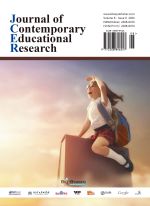Abstract
The purposes of education, both immediate and in the future, are an issue to be pondered. A number of scholars have responded that education has different aims, including the cultivation of citizenship, a flourishing life, and powerful knowledge. This paper aims to explore whether these different general goals accurately fit literary education and attest to them in the form of questions. Under each section, the paper begins by outlining the theoretical analysis and proceeds to present the author’s judgment and reflections based on experiences related to the context of contemporary China.
References
Nussbaum MC, 1997, “Narrative Imagination” in Cultivating Humanity: A Classical Defense of Reform in Liberal Education, Harvard University Press, Cambridge, London, 85–112.
Aristotle, 1997, Poetics, Penguin Classics, London.
Chedzoy A, 1978, Fictional Truth: Literary Education as an Account of Reality. Oxford Review of Education, 4(3): 267–275.
Bai C, Chi W, Qian X, 2014, Do College Entrance Examination Scores Predict Undergraduate GPAs? A Tale of Two Universities. China Economic Review, (30): 632–647.
Ballard B, Clanchy J, 1991, Assessment by Misconception: Cultural Influences and Intellectual Traditions, in Hamp-Lyons L, (ed.), Assessing Second Language Writing in Academic Contexts, Ablex, Norwood, NJ, 19–35.
Reiss MJ, White J, 2014, An Aims-Based Curriculum Illustrated by the Teaching of Science in Schools. The Curriculum Journal, 25(1): 76–89.
Standish P, 1999, Education Without Aims? in Marples R, (ed.), The Aims of Education, Routledge, London, 35–49.
Chambers R, 1974, Literature and Its Uses. Journal of the Australasian Universities Language and Literature Association, 42(1): 207–217.
Young M, 2015, What Are Schools For? Curriculum and the Specialization of Knowledge: Studies in the Sociology of Education, Routledge, London, 105–114.
Dello-lacovo B, 2009, Curriculum Reform and “Quality Education” in China: An Overview. International Journal of Educational Development, 29(3): 241–249.
Kennedy P, 2002, Learning Cultures and Learning Styles: Myth-Understandings About Adult (Hong Kong) Chinese Learners. International Journal of Lifelong Education, 21(5): 430–445.
Bereiter C, 1973, Must We Educate? Prentice Hall, Upper Saddle River, 3–20.
Beck J, 2013, Powerful Knowledge, Esoteric Knowledge, Curriculum Knowledge. Cambridge Journal of Education, 43(2): 177–193.
Young M, 2013, Powerful Knowledge: An Analytically Useful Concept or Just a “Sexy Sounding Term”? A Response to John Beck’s “Powerful Knowledge, Esoteric Knowledge, Curriculum Knowledge.” Cambridge Journal of Education, 43(2): 195–198.
Chen X, 2013, The Study of Mo Yan, Huaxia Publishing House, Beijing.
Claxton G, 1998, Hare Brain, Tortoise Mind, Fourth Estate Ltd, London.
Lang P, 1998, Affective Education: A Comparative View, Cassell, London.
